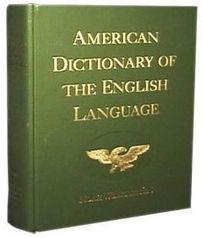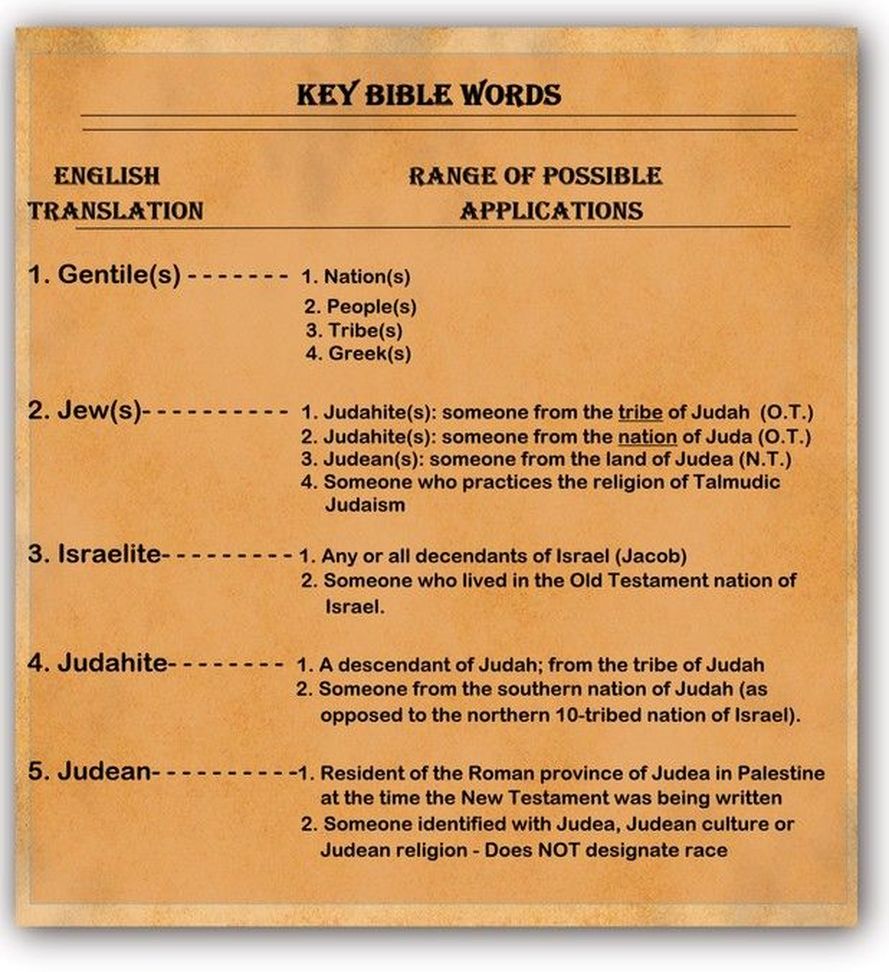An accurate understanding of word meanings is essential for interpreting the Scriptures. Much confusion exists within Christendom today due to the lack of accuracy on the part of both translator and Bible student with respect to the meaning and usages of key words.
"Gentile" is one such misused and misunderstood key word. To some, the word "Gentile" means a non-Jew. To others, it means a "Christian". Still others feel it means "heathen" or "non-Christian." They can't all be right. Just what does "Gentile" mean when it is used in Bible passages? What did Paul mean when he said, "...from henceforth I will go unto the Gentiles." Acts 18:6
This study examines the meanings and usages of the Hebrew word "goy," and the Greek words "ethnos" and "Hellen"; the words from which the English word "Gentile" was translated. We believe that proper under-standing and use of these words will alleviate confusion and equip us to use the Word of God more effectively.
Old Testament
In the Old Testament the word "Gentile" is translated from one Hebrew word that is rendered into English in five different ways. The Hebrew word "goy" or "goyim" (plural) is found in the Old Testament 557 times. It is translated as follows:

As can be seen in the above chart, the most common English translation is "nation" or "nations" (373 times out of 557 occurrences). Not once was "goy" translated "non-Jew." Gensenius' Hebrew-Chaldee Lexicon to the Old Testament defines "goy" as: "A people; nations at large; or Israelites." So the Hebrew word "goy" or "goyim" can mean "nation(s)" or "people" both Israelite and non-Israelite. "Goy" does NOT specify race.
The first time "goy" is rendered "Gentile" in the KJV is Genesis 10:5; "By these were the isles of the Gentiles (goyim) divided in their lands; every one after his tongue, after their families, in their nations (goyim)." Here the same word "goyim," is translated into two different English words in the same verse: "Gentiles" and "nations."
This discord in translation appears again in Isaiah 11:10-12. In verse 10 we read; "...an ensign of the people; to it shall the Gentiles [goyim] seek;" Then in verse 12 we read, "And he shall set up an ensign for the nations [goyim]..."; same idea, same Hebrew word, but two different English words.
In Hosea 8:8 we read; "Israel is swallowed up; now shall they be among the Gentiles [goyim] ..." Then in verse 10 we read, "Yea, though they have hired among the nations [goyim]..." Again, we have the same thought and the same Hebrew word, but two different English words ("Gentiles," and "nations").
A noteworthy verse, in light of the modern definition of "Gentile," is Genesis 25:23. Here, God tells Rebekah that two nations (goyim) are in her womb. This time the translators elected to use the correct word. "nations," for obvious reasons. If they had rendered it "Gentiles" then these two unborn "goyim" (Jacob and Esau), twin grandsons of Abraham, sons of Isaac, would have become two Gentiles in the womb of Rebekah, the mother of Israel: a sensational paradox for anyone who holds that Gentiles cannot be Hebrews.
These are but a few of the many verses showing the inconsistency in translation that creates confusion among Bible readers. Sometimes the translators used the word "Gentile," and at other times they used the word "nation." But consistency and accuracy are missing.
"Goy" means "nations(s)" or "people(s)." The English word "Gentile" in its modern meaning is not generally applicable. Hundreds of years ago(when God's Word was written down, the word "Gentile" was understood differently, but unfortunately it has come to mean "non-Jew" by reason of usage. To learn its ancient and correct meaning, read on.
New Testament
In the New Testament, there are two Greek words (ethnos and Hellen) translated into the English word "Gentile". In Strong's Concordance, the word "ethnos" (#1484) is defined: "ethnos": a race, i.e. a tribe. The King James' translators rendered it as follows:
As you can see, the Greek word "ethnos" is translated into four English words. Notice that Strong's Dictionary does not list "Gentile" as one of the definitions, yet that is the word the translators preferred. Not once did the translators use "race" or "tribe," yet that is how "ethnos" is defined. Why, then, did they use the word "Gentile?"
The English word "Gentile" comes from the Latin "gentilis," which means: of the same gens (genetics; family), clan, or race. This is consistent with the concordance definition of the Greek "ethnos as noted above. But in a modern English dictionary "Gentile" is defined differently from the Latin "gentilis":
Changes in word meanings can have a profound effect upon all forms of learning. Theology (Bible learning) can be affected to the extent that gross revisions can occur, completely changing the writers' intent. Thus, our generation does not know what a "Gentile" really is.
When Bible students read the word "Gentile" in their Bibles, understanding it to mean a "non-Jew," he becomes discouraged because things don't make sense. Hosea 4:6; "My people are destroyed for lack of knowledge."
Now, looking at Luke 7:5 we read, "For he [the Centurion] loveth our nation [ethnos] and he hath built us a synagogue." Here, "ethnos" is translated "nation" and in this case refers to Gailiee. However, notice in John 11:48 where the chief priests and Pharisees said, "...the Romans shall come and take away both our place and nation [ethnos]. " In this case "ethnos" is the nation of Judea. These verses show that the Greek word "ethnos" (usually translated "Gentile") is used to refer to both Galilee and Judea ... a confusion created by the translators.
"Hellen" is the other Greek word translated "Gentile(s)" in the English New Testament. In Strong's Concordance the word "Hellen" (#1672) is: a Hellen (Grecian) or inhabitant of Hellas (Greece); A Greek-speaking person.
The Greek word "Helen," in Romans 1:16, is correctly translated "Greek", "...to the Jew [Judean] first, and also the Greek" [Hellen]. But compare Romans 2:9-10. Here the same phrase "...the Jew [Judean] first, and also to the Gentile (Hellen)" appears twice, but this time "Hellen" is rendered "Gentile." As you can see, the English words "Gentile" and "Greek" were both translated from the same Greek word: "Hellen."
Clearly, the translators should have always translated it "Greek" instead of substituting, 7 times at random, the English word "Gentile." The apparent inconsistency in translation is the kind of thing that causes confusion in readers' minds. Verses like these are used by some people to suggest that anyone who calls himself a "Jew" has a preeminent place in God's eyes while "Gentiles" (so-called non-Jews and Christians) are somehow sub-ordinated. This is faulty reasoning and faulty translating! In the original tongue, these verses suggest no such thing.
The Greek word "ethnos" means any group of people of the same race or nationality who share a common and distinctive culture. It should be translated "nation" rather than "Gentile." Also, the Greek word "Hellen" means "Greek" and should have been thus translated instead of "Gentile." Consistency in translation would have prevented confusion.
CONCLUSION
This study has examined the meanings and usages of the English word "Gentle" by researching the Hebrew words "goy/goyim" from which it was translated in the Old Testament by the King James translators. We have seen that "Gentile" was only one of several words that were used to translate the same Hebrew word. The same type of inconsistency was found in the New Testament with the Greek words "ethnos" and "Hellen."

Also, the modern definition of the word "Gentile" has changed our people's concept of race, nation, and history. It has also corrupted their understanding of Scripture. Most Christians today are victims of error. They've been taught that the people of the world are divided into two exclusive racial categories: 1. Jews, and 2. Gentiles. My Christian friend, there is not one shred of evidence in the Holy Bible to support that myth! It is an error: a false dichotomy that has confused English-speaking Christians for centuries. If you've been taught that you are a "Gentile" and therefore a "non-Hebrew," you too have been deceived! Strangely enough, most Christians are racial Hebrews and most "Jews" are not!
To neutralize Christians, our enemies only need to twist the meanings of key words in our Bibles. The prudent Bible student must carefully research and examine these words, especially when establishing doctrine. II Timothy 2:15; "Study to show thyself approved unto God, a workman that needeth not to be ashamed, rightly dividing [discerning] the word of truth."
The following words are confused by
Translators, Theologians, and the evolution of the English Language.
Translators, Theologians, and the evolution of the English Language.
Bob & Mary Lou Becker - {contact us by using the form at the bottom of our Home Page}




